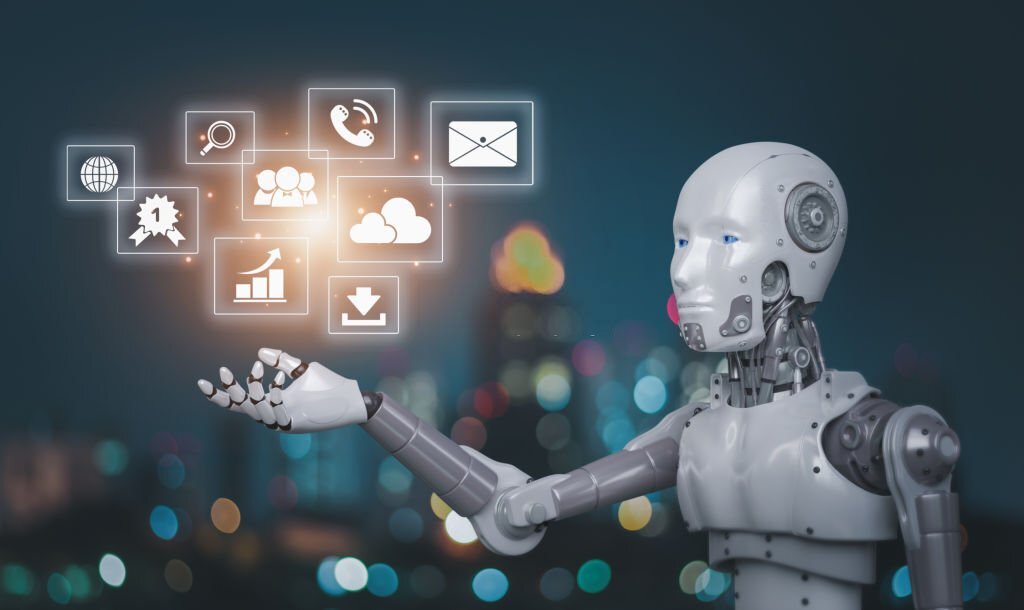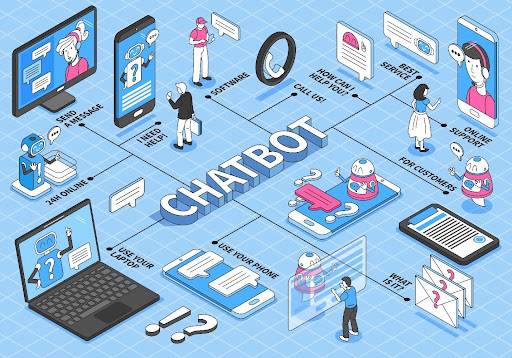Artificial intelligence (AI) is a technology that is increasingly being used in both our personal and professional lives to make things easier and more convenient for us. Whether you know it or not, AI influences your daily life. ChatGPT, the live chat feature on your favorite e-commerce site, face recognition to unlock your phone, and the estimated time your Uber will arrive are all examples.
Even though many industries are just starting to use AI, its effects can already be seen in manufacturing, sales and marketing (using chatbots like ChatGPT), accounting, human resources (using automated applicant screening), and inventory management.
Even though the legal field has been slow to adopt new technologies in the past, AI is starting to have an effect on law firms. By automating routine tasks like document management, billing, and legal research and analysis, AI in law firms could make your business much more productive and save you a lot of money. Let’s look at what AI is and how it might benefit your legal company.
Artificial intelligence: What is it?
A machine that has been trained to carry out one or more human functions is referred to as having artificial intelligence (AI). For instance, set a reminder on your smartphone to contact your buddy Alex at 5:00 p.m. every Wednesday. And unless you instruct your smartphone to stop sending reminders, you’ll get one every Wednesday.
Another term you may be familiar with is “machine learning.” “Artificial intelligence” and “machine learning” are sometimes used interchangeably, but they mean two different things.
Will AI take the place of attorneys?
Without a doubt, AI technologies provide prospects for attorneys. Automation lets lawyers spend less time on tasks that don’t bring in money and more time helping clients.
Legal practitioners should be aware of some of the issues that AI presents. While adopting AI technology, attorneys must be aware of their ethical responsibilities.
AI may help automate processes, save attorneys time, and even make their legal writing more interesting, but it’s not meant to replace people who work. Also, being afraid of technology can stop you from helping even more customers, even though it might save you and your business time.
AI vs. machine learning
AI includes machine learning as a subset. It alludes to the process through which people teach computers to learn from data input. Machine learning searches for patterns in data to make inferences as opposed to just carrying out (or duplicating) a human activity. After the algorithm has figured out how to get one accurate conclusion, it may then apply those findings to fresh data.
How can attorneys in law firms utilize AI?
AI is presently used extensively in the legal sector. While it may not be immediately apparent, artificial intelligence in law companies improves how well paralegals and attorneys do their duties. In particular, AI in law companies assists legal practitioners in changing their practice by putting clients first in a previously unheard-of manner. These are just a few ways that law firms might benefit from artificial intelligence in their operations.
E-Discovery
The simplest and most well-liked sort of AI in law is e-discovery, which is the act of searching electronic material for non-privileged information that is pertinent to a case or claim. Lawyers can search documents using search terms or specific criteria like dates or locations by using e-discovery software.
So, lawyers get answers almost right away, which is a lot faster than scanning paper documents. This additional time enables attorneys to find more pertinent information.
Legal Analysis
Similar to e-discovery software, legal professionals can quickly scan and search huge databases of rules, laws, practice areas, jurisdictions, case laws, and more using AI-powered legal research software. Legal research software allows professionals to gather information and understand precedents.
Management And Automation Of Documents
The challenges of electronic document storage are similar to those of hard copy document storage as law firms continue to move away from paper documents. Even though electronic records require less physical space, sorting and finding documents is still difficult.
AI-driven document management software saves and arranges legal documents, such as contracts, case files, notes, emails, etc., using tagging and profiling features. Finding documents is much simpler with this approach of storing and organizing digital files and full-text searches.
Diligent Effort
Legal experts often need to analyze a significant number of papers, including contracts, as part of due diligence procedures. Similar to other document-related issues, AI may speed up the document review process for legal practitioners.
What’s best? AI can quickly review papers. Although a human evaluation of the material is still advised, attorneys might gain by dramatically lowering the manual work involved in document assessment.
Legal evaluation
It takes a thorough examination of precedent-setting decisions to determine whether a lawsuit is likely to succeed or to calculate its worth. These precedents may be promptly reviewed by lawyer AI, which can then be used to assist attorneys to create more accurate and relevant papers.
How can legal AI help the client and the firm?
The use of AI in law businesses improves the productivity of legal experts. Overall, AI helps decrease the amount of time spent on manual chores, giving up more time to invest in activities that concentrate on developing relationships with clients. Many advantages exist for both clients and the bottom line for law firms:
Increasing Output
Automation of repetitive manual operations with AI increases productivity across the company. To increase efficiency, AI-driven procedures take the place of labor-intensive, time-consuming tasks including contract research, due diligence, and invoice creation.
Lawyers may spend more time on their clients while increasing the amount of billable work they do when they become more efficient.
Increasing Justice Access
Machine learning and artificial intelligence have the potential to lower obstacles to justice, most notably the high expense of hiring an attorney. Lawyers may lower estimates and expenses for clients by spending less time on manual and routine legal work.
For instance, if the research that used to take 20 hours now only takes two, attorneys may pass those savings forward to their clients. Also, by saving time on laborious research, attorneys may use that time to help additional clients. Although the potential for applying AI in the legal sector is present, it has not yet been completely realized.
Better customer-centered services
Giving attorneys and other legal professionals more time is the key benefit of adopting artificial intelligence in law companies. AI-driven technologies that reduce labour and time requirements provide attorneys more time to interact directly with clients and build trust.
Legal professionals should be able to do more than only assist clients with their legal problems. With additional time, attorneys may get to know their clients better and properly understand how and why they need legal counsel.
AI’s ethical implications for legal firms
Lawyer AI is a part of the complex and quickly changing field of technology, where new applications and discoveries happen almost every day. The entire effect or possible applications of such instruments are not yet completely understood. A cautious approach is ideal in a field like a law that is compliance-driven.
Model ABA Rules
The first rule of the American Bar Association deals with “competence” and an attorney’s duty to provide “competent counsel to a client.” In 2012, a note was added to the regulation saying that it is important to know “the benefits and risks of applicable technology” in order to be a good lawyer.
Unconscious bias
Implicit bias is one of the biggest concerns in machine learning and artificial intelligence. No matter how impartial we attempt to be, we are fundamentally biased since we make machines.
According to data, face recognition software, for instance, has trouble correctly recognizing people who are female, black, and between the ages of 18 and 30. Many people think that this is because most of the early users and creators of the technology were white men. The disparity is concerning since law enforcement organizations often employ such technology to help identify criminal individuals.
AI tools for lawyers
In the meantime, lawyers may use a number of powerful AI-driven tools to help them do their jobs better and pay more attention to their clients’ needs. Below is a list of the best tools:
Smith.ai
Smith.ai uses AI to decide how to record and route calls and how to set up its chatbot capabilities. Clio is integrated with the receptionist and chat services.
Gideon
With a short talk, Gideon may fully replace lengthy, friction-heavy intake forms. Clio and Gideon work well together as well.
Casetext
Casetext also integrates with Clio, so legal professionals can conduct searches with one click, right within Clio, and save the results directly to the current matter.
Diligen
Diligen helps attorneys do their due diligence by using machine learning to look through contracts for certain clauses, conditions, or changes and quickly produce a useful summary.
Legal AI: Improving the client-centered process
The future of AI in law firms is still uncertain, but the legal sector has already reaped enormous advantages. Companies should use legal AI technologies if they want to be more efficient, make more money, pay more attention to their clients, and improve access to justice.










2 Comments
[…] Artificial intelligence developments are fundamentally altering company models, and chatbots are gradually taking on increasing importance in customer support channels. A.I. and machine learning make recognizing the substance of client requests, queries, and service inquiries possible. Chatbots continue to gain in popularity as messaging applications overtake social media networks in terms of use. […]
[…] vision and machine vision are sometimes used interchangeably. The technique is often used with AI, machine learning, and deep learning to speed up image processing. Many machine vision solution companies can help […]